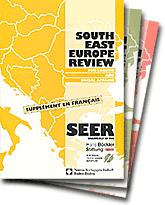The organised world of labour in Serbia today: between economic reforms and populism
The organised world of labour in Serbia today: between economic reforms and populism
Author(s): Petar ĐukićSubject(s): Politics / Political Sciences
Published by: Nomos Verlag
Summary/Abstract: Around sixteen years after the fall of the Berlin Wall and at the beginning of the 21st century, Serbia and Montenegro find themselves at the very start of real, deepseated economic changes towards a market economy, democratic political structures and the rule of law. During the first phase of post-socialist evolution under Milošević’s regime (1990-2000), transition in this country assumed almost exclusively negative characteristics both in the general economic sphere and in the domains of law, politics, culture, education and morality. The democratic political changes that rocked the entire society and changed the ruling political structure in autumn 2000 were accompanied with great hope and launched an entire series of not only positive expectations but also unrealistic hopes and desires for immediate progress and better living and working conditions. However, the organised world of labour in Serbia today is still confronted with major challenges, caused not only by the inconsistent transition process but also by the implementation of severe free market measures and deregulatory changes.
Journal: SEER - South-East Europe Review for Labour and Social Affairs
- Issue Year: 2006
- Issue No: 04
- Page Range: 11-30
- Page Count: 20
- Language: English

